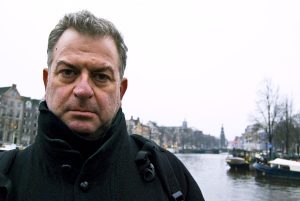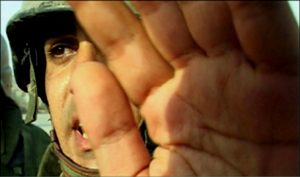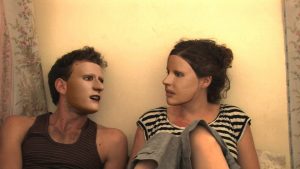The award-winning Israeli documentary filmmaker Avi Mograbi thinks of himself first as a political activist, and he doesn’t believe his hard-hitting—and often bleakly funny—films are making nearly enough of a difference.
Mograbi, whose latest work Between Fences showed at DocLisboa documentary film festival this October, is a veteran filmmaker and protester of Israel’s Palestinian policies. As he explained in a master class at DocLisboa, he was a spokesperson for Yesh Gvul (“There Is a Limit”), a group of military reservists who refused to serve in 1982 Lebanon war, and he was jailed for it. He went on to co-found Breaking the Silence, a group of IDF veterans who testify, collect testimonies and publish work about military actions in occupied territories. (The organization is now under such fierce right-wing attack that they have had to hire personal security.)
Myths of terrorism.
“My work as a filmmaker always involves me being an activist and filmmaker simultaneously,” he said. He recalled for the group his 2005 film Avenge but One of My Two Eyes. In the wake of 9/11 and the second intifada in 2002, he noted the rise of talk of Arab terrorism, mass killings, and suicide bombers. He chose two major touchstones of Israeli identity to provide some perspective. The Biblical hero Samson, after all, after his capture brought down a temple on the heads of thousands of Philistines, and of course killed himself in the process. The heroes of Masada, the desert fortress where Jewish radicals chose to die to the last human being rather than surrender, chose mass suicide and murder of the women and children who never chose to die. The film shows how such myths reinforce right-wing movements today. “So this historical film was all done with contemporary references about the Israeli siege of Palestinian territories,” he said.
During the filming, he decided to pre-release some of the film’s more shocking scenes, including one far-right rock performance, before the film was finished. “It took two years to finish it—these were important to see then,” he said. He eventually released 13 segments in advance.
Part of the story.
He reminded the audience that he often both provoked action and selected what to show in it.
“Don’t ever tell yourself that you ware watching the event the way it happened,” he said. “It always is what the filmmaker thinks the way it should be shown, with endless maybes along the way. And you are never not part of the story, either. As a filmmaker, you go to film but you find yourself involved in the situation even if it’s a passive kind of involvement.
He showed a clip from Avenge, in which a Palestinian family whose mother is suffering from a medical crisis is held up at a checkpoint. He becomes part of the story when the soldier, after dismissing both Palestinians and the MSF woman doctor, calls to him. He is immediately given more attention and respect. “When the soldier in the tank asks me for my press card, it’s clear I’m from a different class,” he said.
Without permission.

Avenge But One Of My Two Eyes (2005)
He considered his relationship to his subjects. In the clip he showed, the Palestinian family was caught in a painful, personal moment of suffering. “They might decide later, I don’t want that to be shown. But there’s no way to ask people in this situation, waiting at a checkpoint in crisis, if they want to be filmed. It’s impossible. I have to decide later.
“There are many moments in editing where you say, I won’t put that in; this person does not deserve this humiliation. But it is always a hard choice. In one film, children in a Tel Aviv neighborhood say terrible things about Arabs, and propose to burn them, they talk directly to the camera, they are happy to do so, it’s a terrible moment. There was no question of looking for their parents to ask permission to put them in the film. So I asked, should I put them in the film or not? And eventually I did–it’s in the film.” He later heard from a friend’s therapist that her daughter was one of those children, but that she felt it was an eye-opening moment for everyone, and made no complaint. “I can’t say I was completely right or wrong there.”
As an activist filmmaker, he never asks anyone for permission to film; the culture of activism includes the camera, regarded as important documentation. “My own son, who is now 30, was arrested endlessly, and once was accused of attacking the soldiers—that’s a much heavier charge. Activist friends gave me the tape documenting the arrest, and when we brought it forward, the judge said to the prosecution, ‘What are you talking about?’ and dismissed the charges.”
Filmmaker as vampire.
In any case, he said, there’s a deeper problem. As a filmmaker you are always stuck between two evils. “In all filmmaking,” he said provocatively, “the filmmaker is a vampire. He sucks life out of people and makes it his own. But me, I’m a good hearted vampire. I’m torn between two evils. One is exposing those people in a very uncomfortable moment. But the other evil is not to show it. If you don’t, you are an accomplice of power. If you saw Titicut Follies, it’s one of the most important films ever made in direct cinema, made in a mental hospital. These are people who have no ability to give informed consent, people are completely naked because that is how they are held there, and it shows horrific humiliation. Each case is different, and you have to weigh the issues, but in this case, Wiseman was exposing the treatment of mental patients. The film was banned for 25 years, because they didn’t want that exposed.
“You break the trust of others all the time. You have to make the proper considerations and take responsibility for breaking the rules. You do it because there is a better reason, a supervening reason.
“I have no proof that the Palestinians whose lives I have shown on camera value this work in spite of my invasion of their privacy. I don’t know if they even have access; there are no cinemas in occupied territories. Palestinians do the same kind of filming, though.”
He then showed a clip of him losing his temper at young soldiers who refuse to open a gate so that young schoolchildren can go home from school.
Exposing conscience.
“Here I think you see the paradoxes in Israel. If you talked like this to an American policeman, I’m not sure it will end up in such a friendly way. But the Israeli armed forces is not separated from society, and it has no authority over Jewish Israeli civilians, so people like me can be outspoken with the soldiers. The soldier says to me, rather mildly, ‘I hope you have a son and that he hears how you are talking.’ I thought it was interesting he proposed talking like father and son. I had shouted at him like an angry father at a delinquent son.”

Israeli ex-soldier and his girlfriend with faces masked digitally, from Z32 (2008)
In the film Z32, Mograbi featured a soldier who had provided a grisly testimony to Breaking the Silence: After several IDF members had been killed, he had followed orders to kill Palestinian functionaries who had nothing to do with the fighting at all. To honor the soldier’s concern to conceal his identity, Mograbi disguised his and his girlfriend’s faces with digital technology. Then he had a crisis of conscience. “I thought, what have I done? I’ve become an accomplice, I’ve provided shelter for an assassin. So I incorporated this concern also into my film. (My films are also their own making-of.) Within the film you see the process of making the film. But how to express my own situation. I decided…to sing.” His composer wrote music that he and others sang, dramatizing his philosophical conflicts; these scenes were interpolated into the confession.
In spite of a solid body of activist work that has reached national and international audiences, Mograbi is disappointed in his effectiveness. “The films don’t touch reality, they don’t do anything,” he complained. “Avenge was made in 2003, it got to festivals in 2005, in Israel it was on a tiny documentary channel that not too many people watch. What I showed in that film has changed since 2003, but only in the cosmetics, Now the checkpoints are buildings and are called ‘terminals.’
“Every project I start, I believe is going to change reality. I want to change reality. I start with a difficulty in my gut, something has to be done about what is happening outside. The only answer I have is to make a film.
“But the films in Israel are not visible enough, they are not part of the discourse. Meanwhile, outside of Israel my career is flourishing. So the films do nothing, but the filmmaker has a great career. Look, you invited me here! Not that I want you to rescind the invitation. But it’s problematic.
“The issue of the filmmaker’s place in the situation is something that troubles me and that enters the films. In Between Fences, we focus on this terrible gap between the Jewish left-wing activists and the unprivileged asylum seekers, who try to work together.
“As you see in Between Fences, you sometimes go out there full of good intentions, but you can’t ever really understand what your position is, on this chessboard. In retrospect, at certain moments, you start to understand. If you don’t share that understanding, it’s problematic. I’m proposing to create a greater awareness about those difficulties. For me, I also decided to put them in the films, and deal with them.”
